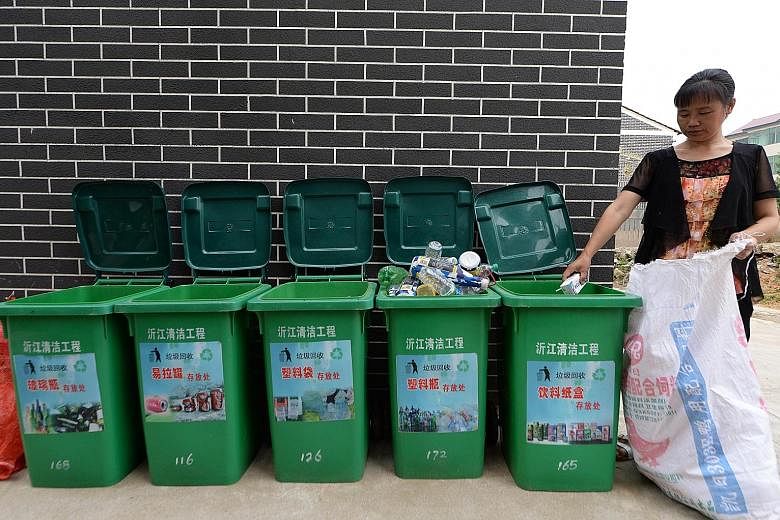FIGHT AGAINST WASTE
Sorting their garbage before disposal became second nature over time for Shenzhen resident Zheng Baowei and her family when they saw others in their community do the same.
"My development has bins for food waste, non-recyclables such as batteries, and old clothes. We sort our rubbish this way as most of our neighbours do so as well," she said.
But the 46-year-old shipping manager knows she belongs to a minority in China. For instance, members of her family who live in Beijing do not share this practice.
So China wants there to be more Madam Zhengs. This month, Shenzhen became the first of 46 cities to implement a garbage-sorting system, complete with fines of up to 1,000 yuan (S$203) for those who do not separate their rubbish.
Beijing has ordered the other selected cities to draw up and start their own sorting programmes by the end of this year, with the goal of achieving a 35 per cent recycling rate by 2020, compared with 20 per cent today.
The plan is backed by a purse of nearly 200 billion yuan to build the necessary infrastructure, including proper collection and disposal systems for sorted rubbish.
But while there is broad agreement that the ambitious campaign is needed, critics are sceptical about whether China's latest go-green gambit will succeed, given how past attempts have fizzled out.
China first began large-scale garbage-sorting trials in its major cities in 2000, when it built colour-coded bin networks and began public awareness drives to encourage the habit.
It also tried baby steps, such as a 2012 pilot targeting 600 communities in the capital to get residents to do simple sorting between dry and wet garbage, with the hope to eventually graduate to more complex sorting, such as of non-recyclables.
But many of these programmes have not delivered results simply because they were not a priority for municipal governments, solid- waste management expert Mao Da told The Straits Times.
"The flaw with these programmes was that there were no hard targets that had to be met by certain deadlines which told the local governments how resolute they needed to be," he said.
The piecemeal efforts to encourage recycling and waste-sorting were far outstripped by rising consumption by China's expanding middle class over the past decade that has seen China grow to become the world's biggest garbage generator by weight.
Explosive growth in e-commerce saw 31 billion parcels delivered in China last year - 44 per cent of the global total - according to figures from the State Post Bureau.
The amount of electronic hardware waste such as mobile phones and laptops that China generates also doubled in the last five years to 6.7 million tonnes, putting it just slightly behind the United States.
Left unchecked, these trends mean China faces the same problem as Hong Kong, which said last week that it is running out of space to dump its garbage as its three landfills will be full in the next two years.
Fortunately for the mainland - and unlike Hong Kong - Beijing has managed to start new incinerator projects over the years, despite resistance from residents who fear the health effects of such facilities in their backyard.
Since its first waste-to-energy plant was commissioned in 2000, the capital has built 26 waste incineration plants, said Mr Sun Xinjun, director of Beijing Municipal Commission of Urban Management. The city announced this month that it now incinerates more household waste (42 per cent) than it throws into landfills (37 per cent).
But even with the constant building of incinerators, Beijing's landfills will reach capacity within the next five years.
The plants have also exacted a political cost, noted experts. Said China environmental law expert Rachel Stern: "There have been a number of protests over incinerator siting in recent years, and the combination of public anger, pollution and the toll on public health has pushed officials to take new measures to reduce waste."
Dr Mao said he is cautiously optimistic that the new initiative will succeed for one reason: The central government is exerting far greater pressure on the cities this time.
In the past, the Ministry of Housing and Urban-Rural Development was put in charge of both building new landfills and incinerators and raising garbage-sorting rates.
"That is an inherent contradiction in goals, and it's obvious which were the more important performance indicators," said the co-founder of volunteer group Beijing Zero Waste.
The new plan shows more promise as it is a directive from the National Development and Reform Commission, China's top economic planner, he noted. "However, setting a targeted recycling level instead of targets to reduce incineration and landfill rates shows that the government is still reluctant to push very hard in this area."
But Dr Stern said the high-profile announcement by Shenzhen and roll-outs in other major cities on the way likely mean that Beijing is eyeing a national programme, probably in the next five years.
"The key to a successful recycling programme is outreach. People need to learn the rules, but it also takes sustained effort to convince them that recycling is a civic responsibility," she said.
Madam Zheng agreed, saying she hopes education efforts start at the schools level: "It was my son who taught me that batteries are very harmful to the environment and have to be disposed of separately."
• Additional reporting by Carol Feng

